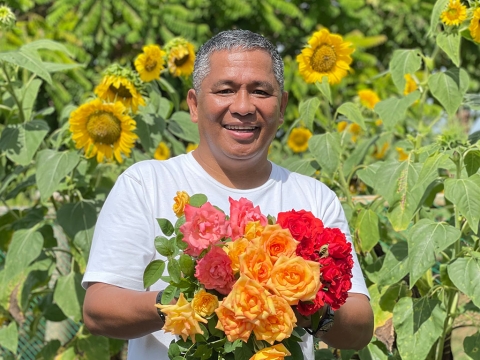Jesus Felipe “Jongjong” Subingsubing of JF Healthy Farm in Albuera, Leyte, showcases some pink, yellow and red roses in his farm. (Photo by ATI Region 8)
DILIMAN, Quezon City – A Leyte farmer is living up to the challenge of growing cutflowers in lowland areas, contributing to the overall local industry supply.
In the Agricultural Training Institute’s (ATI) latest “Agri Asenso” episode with DZRH, guest expert Jesus Felipe “Jongjong” Subingsubing, of JF Healthy Farm in Albuera, Leyte, shared his beginnings on cutflower production and enterprise.
His farm is an ATI-accredited Learning Site for Agriculture, which is now composed of various commodities such as rice, fruits, vegetables, native trees, cutflowers, and ornamental plants.
He said that in one of the training programs he attended, he saw the potential of planting cutflowers using square-foot method and started experimenting on a 200-square-meter land area. After series of trial and error, he now manages half a hectare area, bearing flowers daily.
“I was challenged to plant cutflowers in our farm here in Leyte because many people say that it only thrives on highland areas,” he expressed.
Subingsubing later found out that their sandy-loam type of soil is sufficient in growing cutflowers. They also use a mix of commercial and organic fertilization methods in their farm.
Starting out as a rice farmer, he constantly practices integrated farming even in his flower farm. At present, he is growing some roses, chrysanthemum, sunflower, gerbera, and baby’s breath.
While recounting his journey, the guest expert also highlighted the economic benefits of cutflower production.
Apart from being able to harvest daily, Subingsubing said that the market demand for flowers is high all year round since “there is always an occasion for flowers.”
He furthered, “What’s really good about cutflower business is that there are only a few growers, and our local supply is not enough.”
Also, he added that cutflowers are resistant to typhoons compared to fruits and vegetables.
At the end of the interview, he called on his fellow farmers to venture into cutflower enterprise by “starting small and thinking big.”
This radio program is hosted by DZRH broadcaster Henry Uri and ATI OIC-Assistant Director Antonieta Arceo every Saturday at 5PM. Previous episodes can be livestreamed via the ATI and DZRH social media pages.

